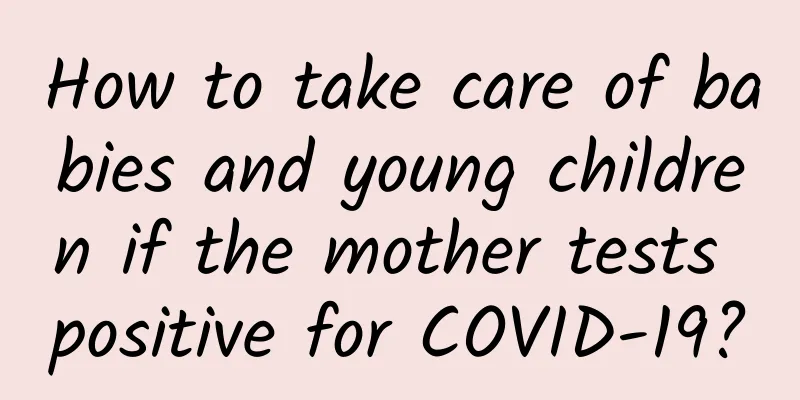How to take care of babies and young children if the mother tests positive for COVID-19?

|
This is the 4153th article of Da Yi Xiao Hu Recently, the number of people who have tested positive for the novel coronavirus has increased. Although everyone is prepared for this after the implementation of the "New Ten Measures" for epidemic prevention and control, pediatric medical staff and parents are still worried that the virus will harm children, especially weak infants aged 0-3 years old. Many parents online and offline asked, "If a baby sticks to his mother every day and is still breastfeeding, how can he feed and care for the baby if the mother is positive for the novel coronavirus? Can he still breastfeed?" Indeed, this is a particularly important issue that requires advance preparation, because mothers are the most important support for the survival of most infants and young children aged 0-3 years old. Mothers, especially breastfeeding mothers, should be the focus of protection and try to avoid infection. If the mother is infected, there is no need to be nervous or panic. After three years of epidemic prevention and control, everyone has learned a lot of epidemic prevention knowledge and skills. 1. Assess the severity of the mother’s condition Good rest, good nutrition, and a good mood are three important factors to ensure that mothers can overcome their illnesses and recover soon. If the mother's illness is not serious, her physical condition and strength can bear the burden of continuing to breastfeed and care for the child, and she is willing to continue to care for the child, and she takes protective measures to ensure the safety of both mother and child, she can continue to breastfeed and care for the baby. If the breastfeeding mother's symptoms are more serious and it is difficult for her to breastfeed, she and her baby can be isolated and the breast milk can be extracted with a special breast pump. Other healthy caregivers can then feed the baby with the extracted breast milk. Before the mother extracts breast milk and the caregiver feeds breast milk, they must take infection control precautions such as wearing a mask and washing hands frequently. 2. Try to stick to breastfeeding Breast milk is the juice produced by the mother's breasts to nourish the baby after birth. It contains lactoferrin, a variety of immunoglobulin antibodies against different pathogens, carbohydrates, proteins, fats, vitamins, minerals, fatty acids, taurine and many other active nutrients that are beneficial to the growth and development of infants. Breast milk is the best food for infants and young children. Breastfeeding is the best gift and greatest love that mothers give to their children. Mother and child are connected by heart, and they form the greatest community of interests. Breastfeeding is the best example of this. Before the child is born, the mother nourishes the child with blood through the placenta and umbilical cord; after the child is born, the mother continues to feed the child with sweet milk. Breastfeeding, while promoting the growth and development of the baby, is also beneficial to enhancing the mother-child relationship and the mother's health. Breastfeeding can promote the involution of the mother's uterus after childbirth, and can also reduce the incidence of breast cancer and ovarian cancer in the mother. 3. Determine whether infants and young children are infected If the mother tests positive for COVID-19, the child should be tested for COVID-19 antigen as soon as possible to determine whether the child has been infected. Regardless of whether the child has been infected, as long as the mother's body allows, breastfeeding can be continued. Current studies have found that the risk of infants and young children contracting COVID-19 through breast milk is extremely low. Breast milk contains antibodies and other anti-infection factors from the mother, and the child can also have good passive immunity to the virus after ingestion. 4. Infants and young children have been infected The main transmission routes of the new coronavirus are respiratory droplets and contact. Mothers and children who are together day and night, especially breastfeeding mothers and infants, can easily pass the virus to their children if mothers do not take special protective measures when breastfeeding and caring for their children. If the child's coronavirus antigen test is also positive, and the mother's condition is not serious and her physical condition permits, then the mother and child can continue their previous life. There is no need to take special precautions such as wearing a mouthpiece during breastfeeding, milk expression, bottle feeding or rooming in. 5. Infants and young children are not infected If the child is not infected, the mother needs to take appropriate infection control precautions before breastfeeding and daily care contact with the child, including wearing an N95 or KN95/KF94 mouthpiece, cleaning hands with soap and water, using tissues when sneezing or coughing, and regularly cleaning and disinfecting surfaces that the mother has touched. If the mother is willing, she can continue to breastfeed, which cannot be replaced by others, and let others take care of the infant's urination, defecation, sleep and other daily chores. In this way, except for feeding time, the mother and child can be relatively isolated, reducing the chance of the infant being infected and also helping the mother to rest. 6. Assess the severity of the infant's condition At present, most infants and young children infected with Omicron coronavirus have a good course, with common symptoms of fever, cough and runny nose, and some children have diarrhea, vomiting, nasal congestion, etc. In the process of growth and development of infants and young children, fever is a pathological and physiological reaction that must be experienced to improve immunity. Many common viral infections are like vaccinations, which have more benefits than disadvantages for the healthy growth of children. If you are sure that your child is infected, you should closely observe the changes in the child's condition during daily care, including eating, drinking, defecating, urinating, sleeping and playing. First of all, don't panic. Don't panic in front of your child. You should smile at your child, communicate with your child, and ask and observe if your child is in pain. If your child smiles happily or laughs with his hands and feet dancing, whether it is the expression of a baby or the words of an older child, as long as he responds to your smile happily, there will be no big problem. If the child is in good spirits, you can continue to observe and treat the child at home. If the child is in poor spirits, has poor response, is drowsy, has significantly faster breathing, is rapid/difficult, has a three-recess sign, has trouble eating, drinking, defecating, sleeping, or playing, and has a fever that persists for 3 days, it indicates that the condition has worsened and you should go to the hospital as soon as possible according to the current epidemic prevention and control plan. The basis for judging whether the child's breathing is significantly accelerated: < 2 months old, respiratory rate ≥ 60 times/min; 2-12 months old, respiratory rate ≥ 50 times/minute; 1 to 5 years old, breathing ≥ 40 times/minute; ≥ 5 years old: respiratory rate >30 times/minute. The three-depression sign refers to the inward depression of the suprasternal fossa, supraclavicular fossa and intercostal space when a child breathes. It is an important sign of dyspnea. 【References】 1. Comprehensive Group of the Joint Prevention and Control Mechanism of the State Council for Responding to the Novel Coronavirus Pneumonia Epidemic. Novel Coronavirus Pneumonia Diagnosis and Treatment Plan (Trial Version 9). 2. State Council Joint Prevention and Control Mechanism Comprehensive Group for the Novel Coronavirus Pneumonia Epidemic. Novel Coronavirus Pneumonia Prevention and Control Plan (9th Edition). 3. Wang Weiping, Sun Kun, Chang Liwen. Pediatrics[M]. Beijing: People's Medical Publishing House, 2018. 4. Xu Lingmin. Common Pediatric Diseases: A Guide [M]. Shanghai: Shanghai Science and Technology Education Press, 2018. 5. Xu Lingmin. Pediatric emergency and emergency questions[M]. Shanghai: Shanghai Science and Technology Education Press, 2020. 6. Xu Lingmin, ed. Basics and Evaluation of Pediatric Medicine[M]. Shanghai: East China Normal University Press, 2022. Author: Qingpu Branch of Zhongshan Hospital Affiliated to Fudan University Pediatrics Chief Physician Xu Lingmin |
<<: Difficulty urinating? Don't forget to check your cervix
>>: Acne, hirsutism - beware of polycystic ovary syndrome
Recommend
How to relieve acid reflux and heartburn in pregnant women
Acid reflux and heartburn are common conditions d...
What to do if perineum is torn? It needs to be repaired in time
Perineal tears often occur during childbirth or a...
Breast size determines fertility
Do female breasts have a big impact on fertility?...
Which zodiac sign is the most fickle? Which zodiac sign is the most infatuated?
Although Capricorns are cold, they will devote th...
What medicine is good for pubic lice?
Pubic lice are a type of insect that develops fro...
How long will the menstruation be delayed after taking birth control pills?
If women want to take emergency contraception, th...
Fallopian tube cystadenofibroma
Fallopian tube inflammation is common in daily li...
Things to note after a cervical biopsy
The uterus is the most important reproductive org...
Pregnant boy reaction in the afternoon
During pregnancy, expectant mothers will have dif...
How to fish in Dashang Reservoir in winter? What to do if the water is shallow in the sunny area during winter fishing?
No matter where you fish in winter, just pay atte...
What are the symptoms after using Jiayin?
For female friends, Jiayin should not be unfamili...
What are the knowledge and skills about childbirth?
Natural childbirth and cesarean section are more ...
Pregnant women with elevated leucine aminopeptidase
Pregnant women with abnormally high leucine amino...
How many months is 28 weeks of pregnancy
In fact, many pregnant women are struggling with ...









